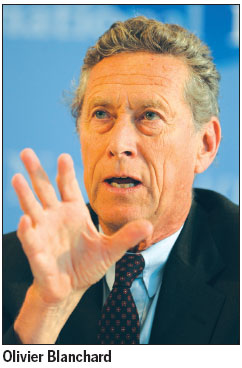IMF raises growth forecast for Hong Kong's economy
Updated: 2010-07-09 07:22
By Joy LI(HK Edition)
|
|||||||||
|
A bird's eye view of residential and commercial property in Central, Hong Kong. The International Monetary Fund has raised its forecast for the city's economic growth this year by one percentage point, citing better-than-expected performance in such industries as real estate, retail, export and financial services. Mike Clarke / AFP |
Fund warns troubles in euro zone may darken 2011 global economic outlook
The International Monetary Fund (IMF) has raised its forecast for both Hong Kong's and the mainland's GDP growth in 2010, reflecting better-than-expected economic activity in the first half of the year, but noted that the danger in the euro zone is looming large, dimming the economic outlook for next year at a global level.
The IMF released its latest update on world economic outlook in Hong Kong on Thursday, following its last projection in April. The Washington-based organization made a 1 percentage point upward revision of its 2010 growth forecast for Hong Kong's GDP to 6 percent, while its forecast for the city's 2011 growth remained at 4.4 percent.
China's economic growth will appear more brisk in 2010, due to reviving export and resilient domestic demand in the first half of the year, the IMF said. It raised the forecast for China's GDP growth in 2010 by 0.5 percentage points to 10.5 percent.
However, renewed financial turbulence in the euro zone is weighing on the growth outlook for the world as well as for China next year, driving down the organization's 2011 forecast for the country by 0.3 percentage point to 9.6 percent.

World growth is projected to reach 4.6 percent in 2010, a 0.4 percentage point upward revision after strong economic activity in the first half of the year. The forecast for world growth in 2011 is unchanged at 4.25 percent. However, counselors at the IMF have warned that the sovereign debt crisis in the euro zone may spill over to other regions through both trade and financial channels, casting a cloud over recovery prospects.
"In this context, the new forecasts hinge on implementation of policies to rebuild confidence and stability, particularly in the euro area. Policies in emerging economies should also help rebalance global demand, including through structural reforms and, in some cases, greater exchange rate flexibility," said the IMF world economic outlook report.
In response to China's latest move to allow more flexibility in its exchange rate policy, Olivier Blanchard, economic counselor at the IMF, said Beijing is heading in the right direction by rebalancing its economy from export to domestic consumption, a reallocation effort the IMF sees taking place more. He also said that it is too early to tell whether the revamped exchange rate scheme will bring in large amounts of capital inflow to China.
Jose Vinals, financial counselor at the IMF, said that the heightened risks in the euro area have strained capital flow to emerging markets. Currently, portfolio flows see a reversed move - from emerging markets to safer assets - after a run-up for almost a year between March 2009 and April 2010. However, he emphasized that the reversal is temporary and will be ended by a strong capital return to the emerging markets.
Earlier concerns regarding real estate overheating in Asia are easing, according to Jorg Decressin, head of the world economic studies division, as cooling measures by governments such as Hong Kong's are taking effect. Figures from the IMF report showed that both real estate transaction values and the ratio of real estate loans over new bank lending have been falling since March 2010.
China Daily
(HK Edition 07/09/2010 page3)
